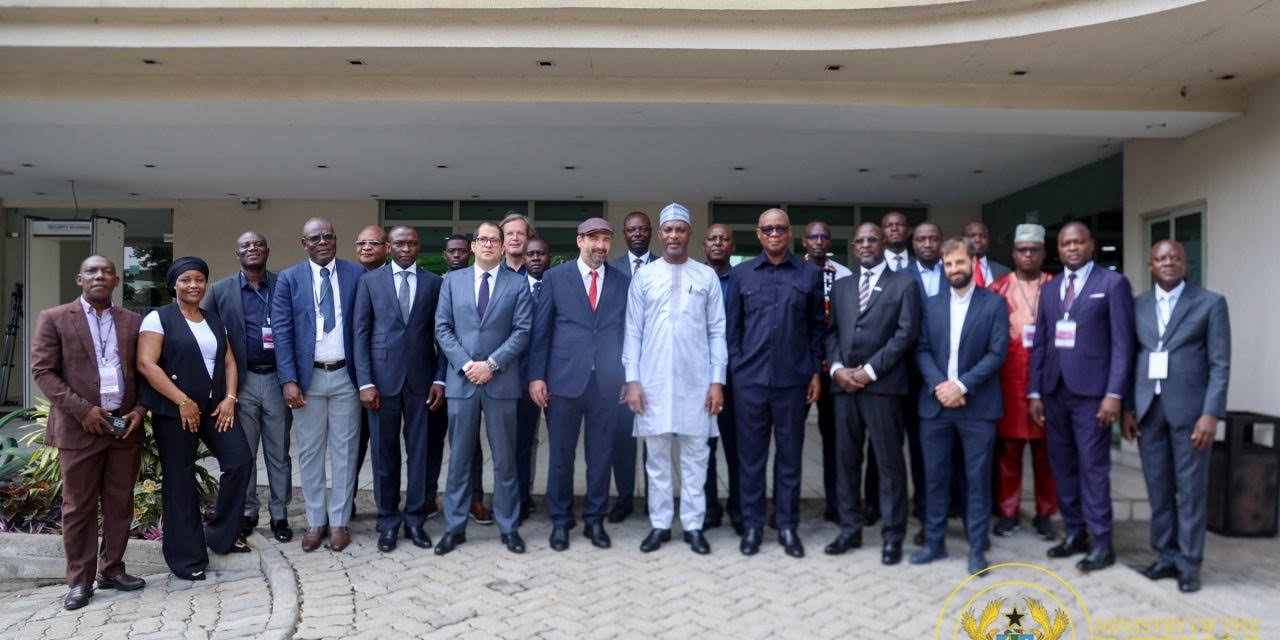News
Ghana hosts High-Level Regional Meeting on Combating Firearms Trafficking

Ghana has taken a significant step in the fight against illicit firearms trafficking by hosting a 3-day high-level Regional Planning Meeting for Operation KAFO VI in Accra, which aims at dismantling arms networks and enhancing regional security.
Addressing participants, the Minister for the Interior, Muntaka Mohammed-Mubarak, noted that “let this planning meeting not be remembered as another workshop. Let it be remembered as the beginning of a new phase in regional enforcement where we do not merely react to threats, but anticipate, prevent and dismantle them. We must see it through with unity, integrity and urgency.”
He stated that the meeting focuses on coordinating joint efforts to combat firearms trafficking and associated threats throughout the West African Sub-region and that Operation KAFO VI emphasises understanding the threat before it reaches borders and also empowers law enforcement officers with data, training and cooperation mechanisms.
Muntaka Mubarak added that the comprehensive training programme integrated into Operation KAFO VI will provide regional training of trainers, national-level capacity building and standardised tools for operational plans and threat assessments.
The operation also promotes gender balance, encouraging the inclusion of more qualified women in all areas, from planning to operations.
The meeting is expected to assist participating countries in identifying key border points for intervention and developing a united and strategic response to arms trafficking and violent extremism. The operation aims to build trust between national authorities, agencies and partners and to facilitate the sharing of intelligence and best practices.
In his welcome remarks, the Chief of the United Nations Office on Drugs and Crime (UNODC) in Ghana, Mr. Christoph Capelle, stated that the Regional Planning Meeting marks another milestone in the fight against illegal arms and crime in West Africa.
He noted that UNODC is providing technical assistance to Ghana because collaboration is essential and no country or agency can combat illicit firearms and crime alone, as the situation has become transnational and complex, requiring a collective effort.
The meeting is expected to bring together representatives from the United Nations Office on Drugs and Crime, the Diplomatic corps and participants from Ghana, Benin, Burkina Faso, Mali and Togo.
News
Prioritise affordable treatment of sickle cell treatment —Health Expert

Health experts have urged Ghana to prioritise affordable and accessible treatment for sickle cell disease (SCD) as advanced, but costly curative therapies remain out of reach.
SCD, an inherited blood disorder, affects about three in every 100 newborns in Ghana.
Globally, around 1,000 babies are born with the condition daily, with three-quarters in sub-Saharan Africa.
The disease causes severe complications including chronic pain, anaemia, infections, strokes and organ damage, often leading to shortened life expectancy.
In recent years, gene therapy has been developed as a potential cure.
However, its cost—running into millions of dollars per patient—makes it financially and technically inaccessible in Ghana.
According to Dr Lawrence Osei-Tutu, a Sickle Cell and Childhood Cancer Expert at the Komfo Anokye Teaching Hospital, “the country must instead focus on practical, lower-cost interventions such as hydroxyurea”, a decades-old cancer drug proven to reduce painful episodes, hospitalisation and life- threatening complications in SCD patients”.
Taken orally, the medicine improves red blood cell function and is considered safe and effective.
“Hydroxyurea therapy is as good as the cure and a low-hanging fruit to pluck, we must bring a cure to our sickle cell warriors, but do so sustainably.” he urged.
In a chat with The Spectator here, he said to create awareness on the disease, the expert noted that despite its benefits, “hydroxyurea is not widely accessible in Ghana.”
Stressing that, “many patients either cannot afford it or struggle with irregular supply through the health system.”
Moreover, he argued that scaling up access would provide immediate relief while the country builds the infrastructure, trains specialists and secures funding needed to support curative therapies in the future.
With an estimated 15,000 babies born with sickle cell disease annually in Ghana, Dr Osei Tutu cautioned that “failure to improve access to effective treatment will leave many patients vulnerable to preventable complications and early death.”
From Kingsley E. Hope, Kumasi
Join our WhatsApp Channel now!
https://whatsapp.com/channel/0029VbBElzjInlqHhl1aTU27
Hot!
Let’s reintroduce Cultural Studies to complement educational reforms — Tourism Minister

Madam Abla Dzifa Gomashie, the Minister of Tourism, Culture and Creative Arts, has emphasised the importance of reintroducing Cultural Studies in schools as part of Ghana’s broader educational reform agenda.
She said Cultural Studies would complement existing efforts to reposition Science, Technology, Engineering and Mathematics (STEM) and Technical Vocational Education and Training (TVET) to promote digital literacy and expand Creative Arts education.
Speaking at the 2025 Homowo Festival of the people of Ningo-Prampram, held on the theme: “Education: The Best Legacy for our Children,” Madam Gomashie said cultural education was critical to national identity and development.
She noted that the festival’s theme aligned with the Government’s vision to transform education in Ghana and encouraged the youth to embrace it not only as a means of personal development but also as a way of preserving traditional values.
These values, including patience, wisdom, and hard work, were at the core of the Homowo celebration, the Minister said.
“Cultural festivals like Homowo are vital instruments for strengthening cultural identity, preserving historical memory, and fostering national unity. Additionally, festivals serve as platforms for educating the youth through storytelling, music, dance, and other traditional practices, while also providing opportunities for community engagement.”
Madam Gomashie highlighted the strong foundation that Ghana’s tourism was built on, which included culture, traditions, and the creative industry, collectively contributing to over GH¢4.8 billion to the economy.
“Festivals give tourists reasons to visit our country. Therefore, with the right infrastructure and the development of all the domains, the sector can do more than what has been recorded,” she added.
Mr Sam Nartey George, the Member of Parliament for Ningo-Prampram and Minister of Communication, Digital Technology and Innovation, commended the community for their vibrant participation in the festival. He announced plans for the construction of a new nursing training school in Ningo, aimed at expanding access to healthcare education in the area.
Nene Osroagbo Djangmah XII, Paramount Chief of Great Ningo Traditional Area; King Dr Tackie Teiko Tsuru II, Ga Mantse; Nene Tetteh Wakah III, Paramount Chief of the Prampram Traditional Area; Prof. Odaifio Welentsi III, Paramount Chief of the Nungua Traditional Area; Naana Dugbakuwor Dugba II, Paramount Queen Mother of Great Ningo; and Mr. Elvis Afriyie Ankrah, Special Envoy on Religion and Inter-Faith Affairs, who represented the Chief of Staff, were among dignitaries at the festival. -GNA














